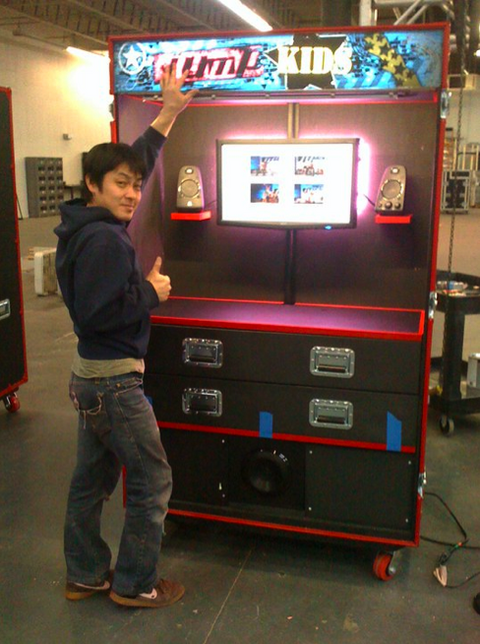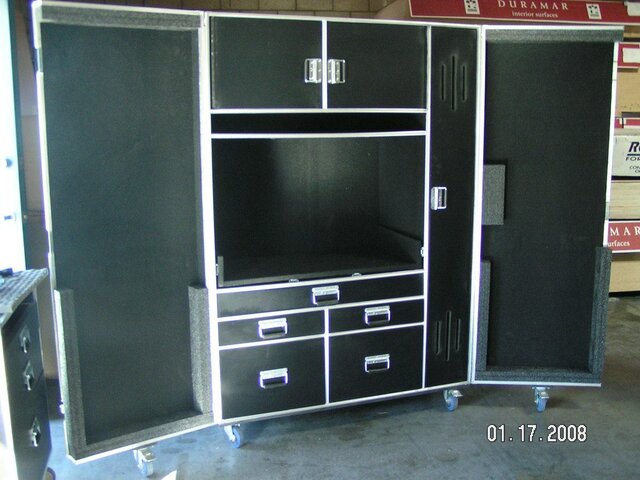I know this is an old thread but I have a question about a
Road Box I'd like to
build. The reason I'd like to
build one instead of buy one is the customization and the fact that shipping would be expensive.
Basically I'm looking to
build an Electrics work box for my own personal use. I'd like it to be able to store Plugs, Soldering
Iron, Some Reference books, A
C-Wrench with attached Leash. A multi-driver kit, hammer,
Gel swatches, a space for
gel tubes, and a
bit more but those things i could add on as an add need basis.
I'm looking basicly for plans to
build my own, I have access to everything from MIG welders to stick welders, Plasma cutters and metal saws, as well as your standard woodworking tools such as table saw,
Swing arm saw (term escapes me at this time), as well as circ saws and drills.
My basic requirements would be to be on wheels as well as have handles and be able to be roughed up a
bit (thinking of using 3/4" ply) I'd Like it between 3' and 4' tall... but size could be fudged a
bit.
Thanks for any insight or info you can give,
Jordan
Couple things I have found useful in the workboxes we have designed and built are to have one side or an area that is a larger 'project area'--at about table height or stool height...something that can be big enough for a
fixture and the area can have a stool or chair pulled up to it to work at. A small but solid hidden pull out shelf on rollers directly under this area adds to the 'workspace' which makes it great for repairs and sorting. This larger space is the area that can have a small hanging pipe for fixtures to be worked on or secured to so they don't fall over and off...a
plug in light source--rope light or
inky's or whatever..and have your main
quad box for
power for chargers or a radio or
power tools
etc. The
quad box mounted inside runs to flushmount recessed
outlet on the outside of your box that takes an extension
cord. Now--a few fun ideas to tweak those--for one of our pull out shelves is we lined the surface of the work shelf with 30 mil
PVC magnetic sheeting, so when we have something disassembled the little screws 'stick' to the surface better instead of just go rolling off when bumped. The
PVC part adds traction too so solder stations & helping hands don't slide around a ton like the do on wood
etc. You can also
line a drawer for your handtools with some of this stuff too so they don't;
roll around a ton..works best for
socket sets that may be loose. The magnetic pull isn't huge but every little
bit helps... Another tweek which is a catch22--for
power use a flushmount recessed
twist lock connector on the outside (no dangle cable)...and carry the extension cable with the
twistlock on one side and a regular wall
plug on the other--about a 20 footer...so you just connect it when you arrive to begin your work to charge batteries
etc. Keeps your cable from being kicked out from your box end..and the other idea being if someone needs an extension
cord they can't go unplugging your cable to run it somewhere else for their
power and suddenly your cable ends up on someone elses rack cause one end is
twistlock. But the catch 22 there is if you break, lose or forget the cable you can't
power your box til you make a new one... I would also suggest you have one drawer or area that is lockable when the box is open..for the expensive toys like testers, meters, parts--things you don't wanna walk or personal items you need to store
etc. Also--it adds weight but if you are gonna move this box around and in and out of a pickup etc--double
line the bottom...two layers of ply so you can fully
bolt thru your casters. It helps eliminate bowing and bending.. That extra weight at the bottom also helps when you pull out drawers so the box doesn't wanna tip forward being front heavy
etc. You may also wish to consider ways to secure the drawers during transport--but that is depending on your design--whether it has doors,
drop ins or is a clamshell or half clam
etc etc. Lots more to think about but thats a few ideas that perhaps will help you out.... Enjoy--building and designing your own toy box is always a fun project.
-w




